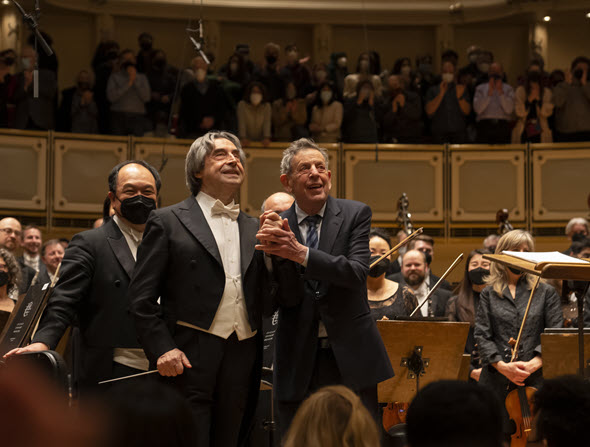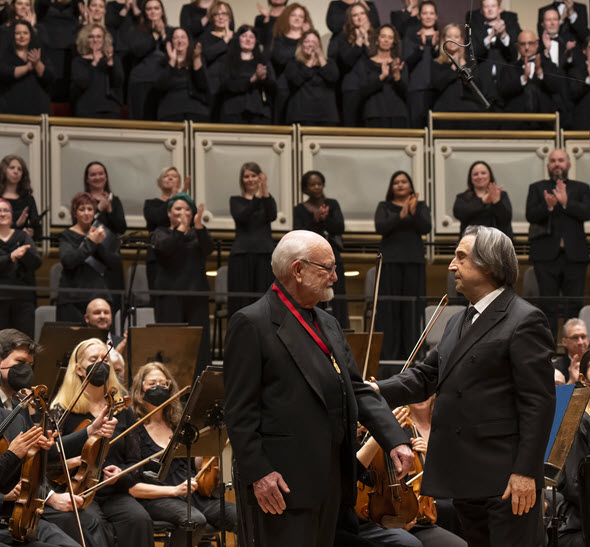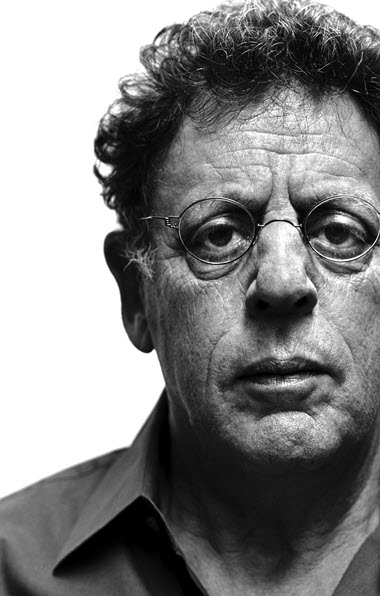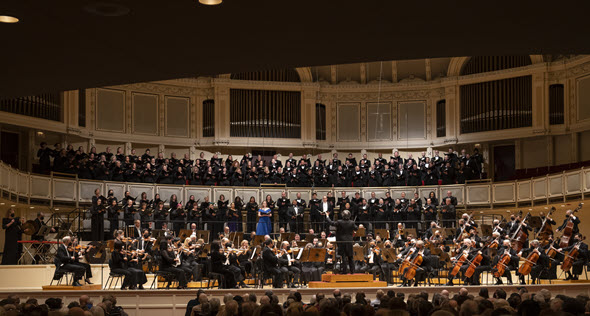When octogenarians Muti and Glass met, vibe at Orchestra Hall rang with renewal of youth

Music director Riccardo Muti takes a bow with composer Philip Glass on a high-energy night at Orchestra Hall, where Glass’ Symphony No. 11 was performed. (Photos by Todd Rosenberg)
Perspective: Philip Glass, 85, has new work in progress; Riccardo Muti, 80, looks to two world premieres. That night, CSO fans rocked.
By Nancy Malitz
It has been a brutally challenging concert season, but on that cold night of Feb. 18, the Windy City got its classical groove back. The house rocked to its feet as 85-year-old Philip Glass, the composer that people still like to call “a minimalist,” stepped onto the stage with the Chicago Symphony Orchestra’s 80-year-old music director Riccardo Muti to take repeated bows for Glass’ Eleventh Symphony, written in 2016. Nights at Orchestra Hall have rarely felt so young.
The Chicago Symphony, like its counterparts throughout the nation, has been struggling for nearly two years with the enervating necessities of keeping people safe under the Covid threat. And yet this Muti-Glass event seemed like a turning point, a regeneration.
One could hardly feel anything but energized by the youthful crowd, and by the remarkable output of this ageless composer, who was on hand to hear his Eleventh. Glass has already produced his Twelfth, Thirteenth and Fourteenth Symphonies and is at work on his Fifteenth, to be given next season by the National Symphony Orchestra at the Kennedy Center.
It’s a robust, highly original output. Glass may have started out as a minimalist radical, focused on electric instruments, bold repetition, and the high-energy punch of rock, but having assimilated that, he turned to opera, and finally to symphonies at the age of 54. Dropping in on the CSO, he heard his Eleventh Symphony performed by an orchestra that he visited repeatedly as an impressionable college youth, during the Reiner era, when university students could hear great works, as Glass put it, “for 50 cents and a short train ride.”
The composer was flown in to hear the Feb. 18 concert by a friend of the CSO. Muti and the musicians seemed at ease with the work by that second performance, and the place was packed. A visible contingent of pre-professional classical hotshots, many of them members of the Civic Orchestra and nearby Chicago universities, were in the house. So were some of the city’s finest jazz musicians, in addition to seasoned subscribers who could be seen tapping their fingers to some of Glass’s bobbling, Brubeck-like syncopations and grooving to his indulgent Brucknerian lines.
“I saw his score and I fell in love with this music,” said Muti earlier that week in an interview at Symphony Center. “When I open a score, I immediately recognize whether this is the work of a professional or a dilletante, and this is a beautiful symphony, a very interesting piece.
“It is my responsibility to be open to all kinds of musical expression. People somehow think of me as a conductor of Mozart and Bruckner, but if you can conduct Mozart, you can conduct anything, and I am genuinely interested. We have done Viennese music, French music, Russian music – this American orchestra conducted by an Italian. Music is the common language brings us all together.”
Muti and the CSO certainly did well by the Glass, which at the Friday performance built to a whirlwind of fast, off-balance rhythms, really a tightwire of juggling at rapid speed. But the memory that sticks longest is the remarkable slow movement, broad yet intricately built. The CSO was all elegance, float and dissolve.
The maestro’s winter residency ended the following week, Feb. 24-27, with four performances of Beethoven’s boundary-stretching Symphony No. 9, featuring four vocal soloists and the Chicago Symphony Chorus. This mighty work, with its exquisite slow movement and serenely angelic plea, sublimely shaped by Muti, is also a majestic fist against fate that suits this dreadful era of human conflict as well as it did Beethoven’s.

Duain Wolfe, director of the Chicago Symphony Chorus, retires at the end of this season. He received the Theodore Thomas Medallion for distinguished service at the Feb. 27 concert.
The work builds over the course of 45 minutes to a massive choral finale, whose singers were prepared by the chorus director Duain Wolfe. He has announced his intent to retire at the end of this, his 28th season, and Muti brought Wolfe onstage to accept the audience’s loud, prolonged and well-deserved applause. At the final performance, Muti and CSO president Jeff Alexander presented Wolfe the Theodore Thomas Medallion for Distinguished Service, a rare exception for an award usually reserved for CSO musicians
The eloquent bass Tareq Nazmi, in his CSO debut, announced the chorale finale with the famous words that translate “O friends, not these sounds!” as the singers then proceeded to offer plaintive hope in a troubled time, that “all men become brothers.” Tenor Issachah Savage and mezzo-soprano Jennifer Johnson Cano, also making debuts, joined soprano Janai Brugger, well-known to Chicago, in their affecting pleas.
But it was the persuasive and astonishingly powerful choral and orchestral forces combined that provided Beethoven’s masterpiece with its chiaroscuro glue here. This work of transcendent clarity as to the nature of humanity’s brightest aspiration – and darkest weakness – seems more vital with every passing day.
Just ahead for Muti in his spring residency are the world premieres he will lead by two CSO Mead Composers-in-Residence. First comes “Orpheus Undone” by Missy Mazzoli (March 31-April 5). Mazzoli’s work was commissioned in 2020 although Covid has delayed its premiere until after her tenure ended. She describes it as an exploration of two moments in the Orpheus myth – Eurydice’s death, and Orpheus’ decision to follow her into the Underworld. Mazzoli has also been commissioned to write an opera based on the surreal experiences of President Lincoln, whose young son was dying while the nation underwent the worst agonies of the Civil War.
Jessie Montgomery’s “Hymn for Everyone” is on the CSO calendar for April 28-May 3. She recently described it as based on a hymn-like melody that permeates the entire piece. The African-American composer is also working on an opera, still in the early workshop stage, based on the life of her great-great-grandfather, who served on America’s western frontier at the end of the Civil War as a Buffalo Soldier. Meanwhile, the pianist Awadagin Pratt has commissioned a piano concerto from her that he will perform throughout the spring and into summer with orchestras including the Baltimore, Colorado, Indianapolis and Milwaukee Symphonies.




